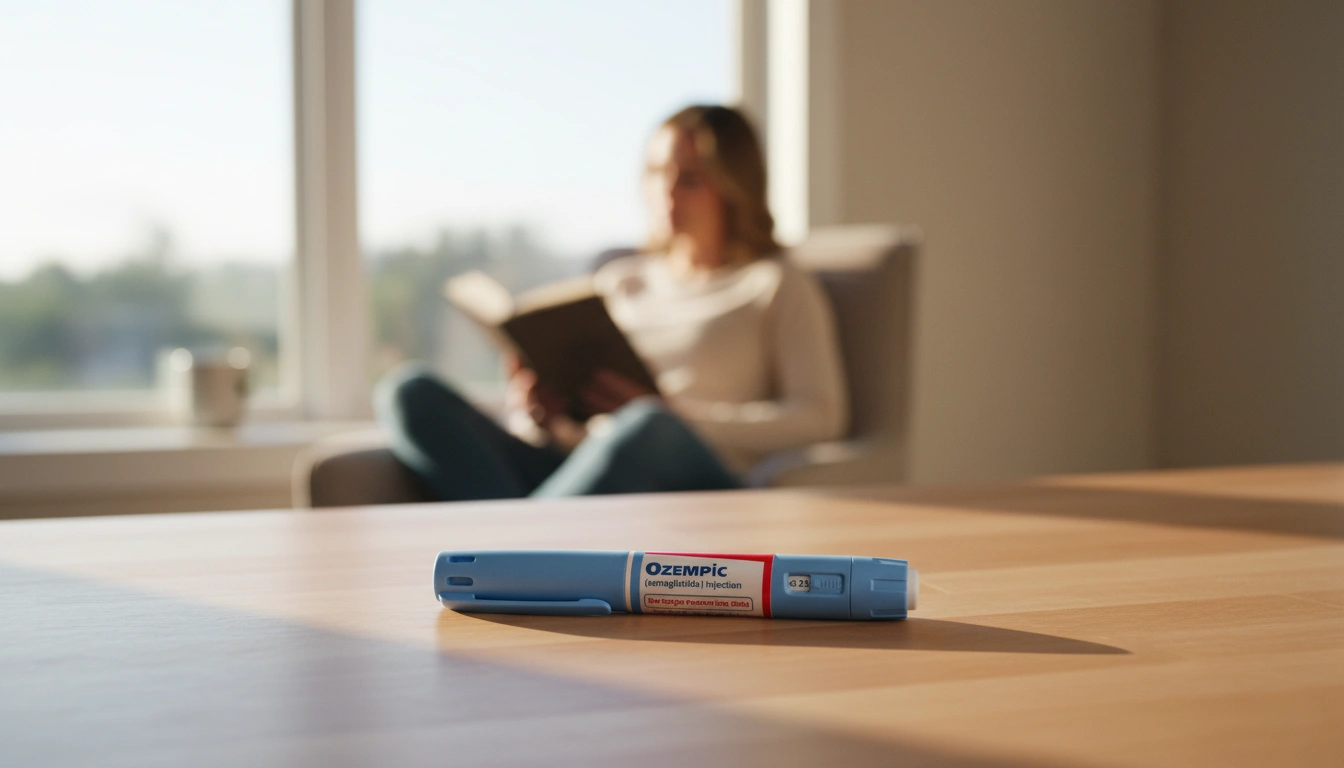Can Ozempic Stop Working for Weight Loss?

Introduction
Weight loss can feel like an uphill battle, especially when you hit a wall after initially seeing progress. For many, medications like Ozempic have provided a beacon of hope in the weight loss journey, showcasing impressive results. However, just as the joy of losing weight begins to take hold, some individuals find themselves grappling with a frustrating plateau. So, can Ozempic stop working for weight loss?
In this blog post, we will delve deep into the complexities of weight loss with Ozempic, exploring the reasons behind weight loss plateaus, the potential for diminished effectiveness over time, and strategies for overcoming these challenges. We aim to empower you with knowledge and insights that can enhance your understanding and approach to weight management.
Together, we’ll explore the mechanisms of Ozempic, how it interacts with your body, and the lifestyle changes that can support your weight loss journey. We’ll also discuss the importance of personalized care, emphasizing how our approach at TrimRx aligns with your individual weight loss needs and goals.
Did you know that nearly 80% of individuals who lose weight with medications like Ozempic can experience a plateau within the first year? While this statistic may seem disheartening, it underscores the reality that weight loss is often a complex and non-linear journey. For many people, the initial excitement of shedding pounds can give way to the frustration of stalled progress, leaving them wondering: “Why isn’t Ozempic working for me anymore?”
Ozempic, a medication designed primarily for managing type 2 diabetes, has gained popularity for its effectiveness in aiding weight loss. It works by mimicking a hormone called GLP-1, which plays a crucial role in regulating appetite and food intake. However, like many weight loss methods, its efficacy can diminish over time, leading individuals to question whether it has stopped working.
The purpose of this blog post is to explore the various factors that contribute to weight loss plateaus while using Ozempic and to provide actionable insights on how to navigate these challenges. We will cover the biological mechanisms behind weight loss plateaus, the role of individualized care, and practical tips to maintain progress. By the end of this post, you will have a clearer understanding of what to expect from Ozempic, how to adapt your approach, and the importance of a personalized weight loss journey.
Let’s embark on this journey together as we uncover the intricacies of weight loss with Ozempic while emphasizing the value of personalized care and support.
Understanding Ozempic and Its Role in Weight Loss
Ozempic (semaglutide) is a GLP-1 receptor agonist that has shown remarkable results in managing weight for individuals struggling with obesity. It works by enhancing feelings of fullness, reducing hunger, and slowing gastric emptying—factors that can significantly impact food intake and weight management.
The Mechanism of Action
Upon administration, Ozempic mimics the effects of GLP-1, a hormone that naturally occurs in the body. This hormone is released in response to food intake, signaling to the brain that you are full and reducing the urge to eat. By slowing down the gastric emptying process, Ozempic prolongs the feeling of satiety, allowing individuals to consume fewer calories without feeling deprived.
Initial Weight Loss Success
Research indicates that many individuals can achieve a weight loss of 10% to 15% of their body weight while using Ozempic. This initial success is often accompanied by significant improvements in metabolic health markers, such as blood sugar levels, blood pressure, and cholesterol levels.
The Reality of Weight Loss Plateaus
Despite the promising results, weight loss is rarely a straight path. After experiencing initial success, many individuals find that their weight loss progress stalls or plateaus. This phenomenon can be attributed to several factors, including metabolic adaptations, hormonal changes, and individual differences in how the body responds to medications.
What Causes Weight Loss Plateaus on Ozempic?
Understanding why you might hit a plateau while taking Ozempic can help demystify the process and empower you to take action. Here are some common reasons for weight loss plateaus:
Metabolic Adaptation
As you lose weight, your body undergoes metabolic adaptations that can make further weight loss more difficult. When you lose weight, your body requires fewer calories to maintain its new weight, which can slow down your metabolism. This process, known as adaptive thermogenesis, means that your body is working against you as it adjusts to the changes.
Hormonal Changes
Hormones play a significant role in regulating appetite and metabolism. As you lose weight, levels of hormones such as leptin (which signals fullness) may decrease, while levels of ghrelin (which stimulates hunger) may increase. This hormonal shift can lead to increased hunger and cravings, making it more challenging to maintain weight loss.
Resistance to GLP-1 Effects
Over time, your body may become less responsive to the effects of Ozempic. This phenomenon, known as tachyphylaxis, occurs when the body adapts to a medication, diminishing its effectiveness. If you notice that your weight loss has stalled despite consistent use, this could be a contributing factor.
Inadequate Dosage
When beginning treatment with Ozempic, healthcare providers typically start patients on a lower dose to minimize potential side effects. However, as your body adjusts and weight loss progresses, it may be necessary to increase the dosage to continue seeing results. Regular consultations with your healthcare provider can help ensure that you are on the optimal dose for your needs.
Underlying Health Conditions
Certain health conditions, such as hypothyroidism or insulin resistance, can hinder weight loss efforts. These conditions may affect how your body processes medication and responds to dietary changes. If you suspect that an underlying health issue may be impacting your weight loss, it is essential to discuss this with your healthcare provider.
Lifestyle Factors
Your lifestyle choices play a crucial role in weight management. Inconsistent exercise, poor dietary habits, and inadequate sleep can all contribute to weight loss plateaus. Making conscious efforts to incorporate healthy habits can help break through barriers and support continued progress.
Strategies to Overcome Weight Loss Plateaus
If you find yourself at a standstill while using Ozempic, don’t be discouraged. There are several strategies you can implement to help overcome a weight loss plateau:
Reassess Your Goals
Take a moment to evaluate your weight loss goals. Are they realistic and attainable? Sometimes, our expectations may not align with what is healthy for our bodies. Working with a healthcare professional can help you set more achievable targets that prioritize overall health and well-being.
Adjust Your Dosage
If you’ve been on the same dosage of Ozempic for an extended period, it may be time to consult your healthcare provider about adjusting your dosage. They can assess your progress and determine whether a higher dose could enhance your weight loss efforts.
Focus on Nutrition
Revisiting your dietary habits can lead to significant improvements in weight management. Aim for a balanced diet rich in whole foods, including fruits, vegetables, lean proteins, and healthy fats. Consider consulting a registered dietitian to create a personalized meal plan that aligns with your weight loss goals.
Increase Physical Activity
Regular physical activity is vital for maintaining weight loss and improving overall health. Consider incorporating a mix of cardiovascular exercise and strength training into your routine. Strength training can help build muscle mass, which can boost your metabolism and promote further weight loss.
Prioritize Sleep and Stress Management
Lack of sleep and high-stress levels can hinder weight loss efforts. Aim for seven to nine hours of quality sleep each night and find effective ways to manage stress, such as mindfulness practices, yoga, or engaging in hobbies you enjoy.
Stay Consistent with Medication
Ensure that you are taking Ozempic as prescribed. Irregular doses can diminish its effectiveness and lead to weight loss plateaus. Setting reminders or using pill organizers can help you stay on track.
Seek Support
Weight loss journeys can be challenging, and having a support system can make a significant difference. Whether through friends, family, or online communities, connecting with others who share similar goals can provide motivation and encouragement.
Consult with Healthcare Professionals
Regular follow-ups with your healthcare provider are essential for monitoring your progress and making necessary adjustments. They can help identify any underlying issues that may be impacting your weight loss and provide tailored advice to support your journey.
The Importance of Personalized Care at TrimRx
At TrimRx, we understand that each individual’s weight loss journey is unique. Our commitment to personalized care ensures that you receive a treatment plan tailored to your specific needs and goals. We believe that sustainable weight loss can only be achieved through a comprehensive approach that combines cutting-edge telehealth innovations with empathetic, medically supervised care.
Comprehensive Support
Our personalized weight loss programs include not only medications like Ozempic but also doctor consultations, lab work, unlimited support, and shipping with no hidden fees. We partner with FDA-registered and inspected pharmacies to ensure the highest quality medications and services.
Free Assessment Quiz
To begin your weight loss journey with us, we encourage you to take our free assessment quiz. This quiz helps us understand your unique needs and determine your eligibility for prescription weight loss medications. By tailoring our approach, we aim to maximize your chances of success and make sustainable weight loss attainable.
Take the free assessment quiz here.
Conclusion
In the pursuit of weight loss, it’s essential to recognize that plateaus are a natural part of the process. Understanding the factors that contribute to weight loss plateaus while using Ozempic can empower you to take proactive steps to overcome them. By reassessing your goals, adjusting your dosage, focusing on nutrition, increasing physical activity, and seeking support, you can continue on your journey towards achieving and maintaining a healthier weight.
At TrimRx, we are dedicated to helping you navigate your weight loss journey with personalized care and support. Our approach integrates medical science with modern technology to provide you with the tools needed for lasting success. Remember, the journey may be challenging, but with the right resources and guidance, you can achieve your weight loss goals and embrace a healthier lifestyle.
FAQ
Why does Ozempic stop working for weight loss?
Ozempic may stop being effective for weight loss due to metabolic adaptations, hormonal changes, resistance to the medication, inadequate dosage, underlying health conditions, or lifestyle factors that impact weight loss.
What can I do if I hit a plateau while taking Ozempic?
If you hit a plateau, consider reassessing your weight loss goals, adjusting your medication dosage, focusing on nutrition, increasing physical activity, prioritizing sleep and stress management, staying consistent with medication, seeking support, and consulting with healthcare professionals.
Is it normal to experience weight loss plateaus?
Yes, experiencing weight loss plateaus is common when using medications like Ozempic or any weight loss method. Understanding that this is a typical part of the journey can help you stay motivated and focused on your long-term goals.
How can I personalize my weight loss plan?
At TrimRx, we offer a free assessment quiz to help tailor your weight loss plan to your unique needs. Our comprehensive approach includes medications, consultations, and ongoing support to ensure you receive the care you need.
Can I regain weight after stopping Ozempic?
Yes, weight regain can occur after discontinuing Ozempic. It’s important to maintain healthy lifestyle habits and follow up with your healthcare provider to ensure ongoing management of your weight.
Together, let’s make your weight loss journey a successful and empowering experience.

Transforming Lives, One Step at a Time
Keep reading
Ozempic Before and After: Real Results and Timelines
The transformation photos are everywhere. Social media feeds, news articles, celebrity coverage. People showing dramatic weight loss, completely changed body shapes, faces you almost…
How Much Weight Can You Lose on Ozempic? Real Data and Expectations
It’s the first question everyone asks: How much weight will I actually lose? You’ve seen the dramatic before-and-after photos. You’ve heard stories of people…
Ozempic Weight Loss Results: What to Expect Month by Month
You’re considering Ozempic or you’ve just started, and you want to know what’s realistic. How much weight will you actually lose? When will you…



